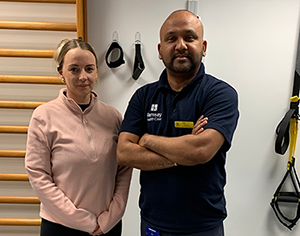What are kidney stones
Kidney stones are hard stone-like lumps formed from minerals and salts that crystallise in your kidneys. They can vary in size, ranging from as small as a grain of sand to as large as a golf ball and affect any part of your urinary tract.
What causes kidney stones?
Kidney stones develop when your urine contains high levels of substances like calcium, oxalate, and uric acid, which can form crystals.
Factors that can contribute to kidney stone formation include:
- dehydration
- certain diets
- obesity
- medical conditions that affect calcium metabolism.
What are the first signs of kidney stones?
The first signs of kidney stones often include sharp, sudden pain that typically your lower back or side, just below your ribs. This kidney pain location can radiate to your abdomen and groin as the kidney stone moves through your urinary tract. Kidney stone pain is often described as cramping or throbbing, with intensity that fluctuates, coming in waves before subsiding and then flaring up again.
In terms of kidney stones symptoms, smaller stones may pass painlessly and without notice, while larger stones are more likely to cause significant discomfort. As the stone irritates your urinary tract lining, other kidney stones symptoms may include:
- Blood in your urine, which can make it appear pink, red, or brown.
- A persistent urge to urinate.
- Nausea and vomiting, especially if the pain becomes severe.
For larger kidney stones, additional symptoms can include:
- Severe, radiating pain that comes and goes and can reach your groin or, for men, the testicles.
- Fever and sweating.
- A urine infection.
Identifying kidney stones symptoms early, such as the characteristic kidney stone pain or other accompanying signs, is essential for timely treatment and to prevent complications. If any of these symptoms occur, particularly severe or worsening pain, it’s important to consult a healthcare professional.
Diagnosis and tests for kidney stones
Diagnosing kidney stones involves a physical examination and tests to confirm their presence, size, and location. Common diagnostic tests include:
- Urine testing – to identify blood, infection, or substances like calcium or uric acid linked to stones.
- Imaging studies:
- CT scans – to provide detailed images of your urinary tract to locate kidney stones.
- Ultrasound - a safe, non-invasive option to detect stones, often used for pregnant patients.
- X-rays - occasionally used for detecting specific types of stones.
- Blood tests – to measure your kidney function and detect conditions including high calcium or uric acid levels.
These tests ensure accurate diagnosis and guide effective kidney stones treatment to help prevent complications.
Common treatments for kidney stones
Kidney stones treatment varies depending on their size, type, and severity of symptoms:
Small stones:
- These may pass naturally through your urinary tract with the help of increased fluid intake, such as drinking plenty of water.
- Over-the-counter or prescribed pain relievers can help manage discomfort when passing stones.
- Doctors may also recommend medications to relax your ureter and facilitate stone passage.
Larger stones
- Shock Wave Lithotripsy (SWL) - uses sound waves to break the stone into smaller pieces that can pass naturally.
- Ureteroscopy – inserts a thin scope into your urethra and bladder to locate and remove or break up the stone.
- Percutaneous nephrolithotomy - a minimally invasive surgical procedure to remove large stones directly through a small incision in your back.
How to prevent kidney stones
You can help prevent kidney stones and maintain overall urinary health by taking these steps:
- Stay hydrated - drink 2 to 3 litres of water daily to dilute urine and reduce stone-forming minerals.
- Eat a balanced diet – limit your salt intake, moderate oxalate-rich foods like spinach, rhubarb, beets, and nut, incorporate plenty of fruits and vegetables, and maintain a diet rich in calcium from natural sources.
- Maintain a healthy weight - obesity can increase the risk of kidney stones, so regular exercise and a balanced diet help to lower your risk.
For recurrent stones, doctors may prescribe medications or recommend regular check-ups to manage underlying causes and track risk factors effectively.



